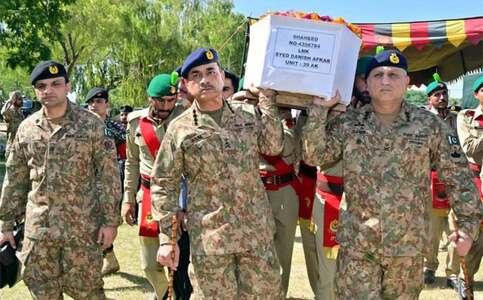ISLAMABAD, Nov 30: Experiencing a rise in its illiterate population, Pakistan ranks second among the countries of the world with highest number of out-of-school children.
These shocking revelations about Pakistan, which spends a little over 2 per cent of its GDP on education, were made in Unesco’s Education For All Global Monitoring Report 2007 launched here on Thursday.
However, Minister of State for Education Anisa Zeb Tahirkhaili, who was the chief guest at the launch ceremony, said she was hopeful about the situation despite Unesco’s scepticism.
Talking to Dawn, the minister said the government had taken the issue of out-of-school kids as a challenge.
According to the report, Nigeria with some 8 million out-of-school kids stands first in the hall of shame, whereas India follows Pakistan at the third spot with 4.5 million such kids. Ranked fourth, Ethopia fares better than nuclear powers Pakistan and India.
To make matters worse, the net enrolment ratio (NER) in Pakistan is less than 80 per cent as compared to other developing countries where enrolment ratios jumped to over 85 per cent by 2004, says the report, adding that NERs increased significantly in South and West Asia from 77 per cent to 86 per cent, with the exception of Pakistan and Nepal.
It says that of the 6.5 million out-of-school kids, 80 per cent were never enrolled, 10 per cent dropped out, while the remaining could get to school at some later stage.
The grave situation can be a direct fallout of poverty as some 65.6 per cent of the population lives on less than $2 a day, it says.
According to the report, a study of primary school attainment in rural areas of Punjab and NWFP concluded that economic constraints on households are a key factor in explaining the out-of-school phenomenon. The sudden loss of remittances from a household member or the birth of an extra sibling both significantly increase the likelihood. The population growth rate in 1.8-2 per cent.
The study linked this issue to another unfortunate reality: the high incidence of stunting. Approximately 37 per cent of the children of less than 5 years of age suffer from stunting in the country. Under-nutrition has a negative impact on school participation and achievement. Studies in Pakistan and other countries showed that stunted children were less likely to enrol in school, and more likely to enrol later and to drop out.
Poverty explains part of this correlation.
The disability incidence rate among children in the country is also towards the higher side. Almost 15 per cent suffer from impairments such as seizures, cognitive, motor, vision or hearing disabilities.
Javed Hassan Ali, chief of policy review team of the education ministry, put a question mark on the government’s initiatives for enhancement of literacy rates and enrolment ratios, saying: “All that has so far been done can bring numerical results, but qualitatively little has been done.”
He said the average period spent in school was 3.8 years for boys and 1.3 years for girls.
Mr Ali said increase in financial resources alone would not do the trick, capacity would also have to be increased.














































Dear visitor, the comments section is undergoing an overhaul and will return soon.